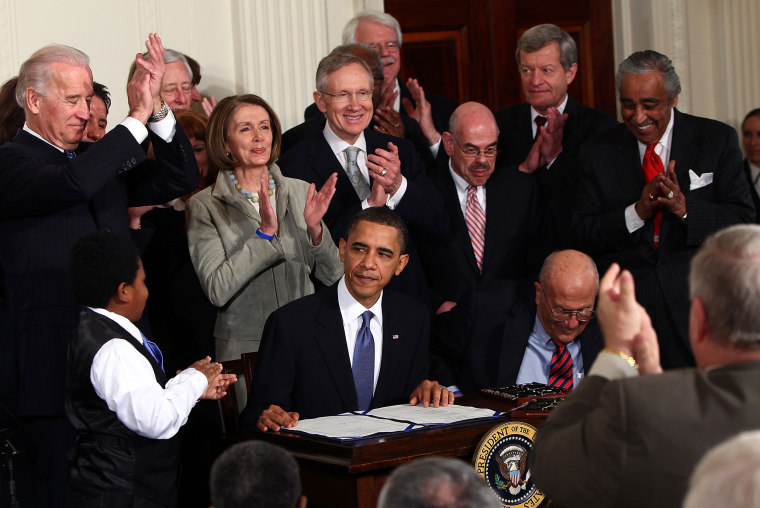For more than a decade, Americans have been accustomed to existential political fights surrounding the Affordable Care Act. Since before Barack Obama even signed the ACA into law, Republican politics has been dominated by its seething contempt for "Obamacare" and its desperate desire to destroy the system and its benefits.
That phase of the political dispute appears to have run its course. As the New York Times noted yesterday, "The era of existential fights over Obamacare has ended."
The evidence to bolster the observation is plain. The Affordable Care Act has never been more popular. It has never helped more Americans. Its prices and benefits have never been better. And as of yesterday, the U.S. Supreme Court has shielded the ACA -- for the third time -- from a Republican effort to tear it down in its entirety.
All of which suggests that the Affordable Care Act isn't just the law of the land, it's also a system that isn't going anywhere. All of the major players -- policymakers, providers, insurers, hospital administrators, et al. -- can stop thinking about "repeal and replace" schemes and start thinking about the next phase in the nation's health care system.
For Democrats, that creates an opportunity to follow a similar trajectory to what the party did with Social Security in decades past: build on a strong foundation. There's no shortage of progressive possibilities, ranging from lowering the Medicare eligibility age to creating public options to tackling the Medicaid coverage gap.
For Republicans, the future is ... murkier. The party that spent a decade defining itself by its irrational, and at times incoherent, hatred for "Obamacare," doesn't quite know what to do now. The Washington Post reported overnight:
Some Republicans conceded Thursday that, after a decade of repeal votes, political campaigns and legal challenges, their quest to nullify the entire law probably is dead. Confronted with a 7-2 ruling that marked the third time the high court has preserved the law, some GOP members of Congress suggested that they would, instead, start plotting legislatively to trim back parts of it.
After yesterday's Supreme Court ruling, I looked for prominent Republican officials issuing thunderous declarations about trying once more to uproot the nation's health care system, but no such pronouncements were made. Leading GOP voices went through the motions -- they're still pretending the ACA has failed in some undefined ways -- but much of the party was content to simply acknowledge the end of the court fight and move on.
As a political matter, that's wise. Anti-ACA politics may have benefited Republicans in the 2010 midterms, but in recent years, it's Democrats who've put GOP officials and candidates on the defensive, reminding voters at every possible opportunity that Republicans intend to put families' health security at risk.
Or put another way, health care went from being a potent political weapon used against Democrats to being a cudgel Democrats were eager to wield.
Looking ahead, health care fights are likely to continue, but with different kinds of stakes. Democrats will push for Medicaid expansion in red-state holdouts, and Republicans will say no. Democrats will push to keep costs down, and Republicans will say no. And Democrats will push for greater coverage options through Medicare and public options, and Republicans will say no.
It will no doubt be frustrating, especially for those who are struggling, but it'll be less ridiculous than waiting for Republicans to finally deliver on the elusive, superior to the ACA they promised to deliver 12 years ago.
